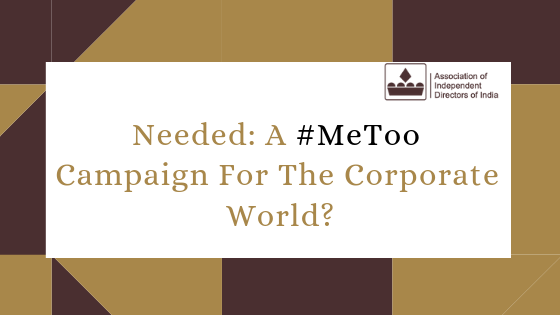Such a maleficent topic of #MeToo isn’t just confined to the entertainment industry, but cases of sexual harassment are predominantly existent in the workplace environment too. It’s hard to imagine that any organisation would tolerate this kind of abuse, however, there exists a culture which discourages women from speaking out as a part of non-disclosure clauses and termination settlements. So, women in the contemporary corporate world feel empowered, but at the same time remain fearful. #MeToo movement is at full potential today, but supporters of the movement are still afraid about what will happen when the movement loses its potency.
Even with all the talk of gender diversity in top companies, India still witnesses a severe scarcity of women in senior management positions. In 2018, women held only 7% of senior management roles. The issue here is not non-availability of capable and qualified women, it is the lack of efforts of corporate organisations to secure and comprehend women rights. For every unutilised female talent, there is a corresponding economic loss.
Senior management often accustoms to stereotypical mindsets about leadership that “women take care while men take charge.” Sexual harassment is more common at workplaces than it ever was. Even with women employed at good managerial positions, there have been many such incidents of harassment and inappropriate behaviour that the only off-centre way for them was to resign despite their skillset being better than anyone around them.
#MeToo is often seen as a conviction of justice for women. It has served as well in many cases, but, when it comes to the corporate world, a more robust solution to this critical problem is to employ more women at C-Suite level positions like CEO or as Independent Directors of the organisation, thereby lowering the need for such movements to occur in the first place. Such mechanisms, when put in place won’t just provide victims with a better redressal committee but also a better conducive environment to share the toxic series of events they had to go through. Women Independent directors will not just sympathise at such occurrences, but, they will empathise. This empathy will lead to strong action towards the culprits and will for real, serve justice.
A saddening revelation that came through a recent study is that women held under a quarter (24%) of senior roles across the world in 2018, a decrease from 25% in 2017. This can easily be linked to sexual harassment and provides for further evidence of this issue, KPMG disclosed that 7 of its UK partners left the firm citing similar reasons over the past 4 years, Delloite had to lose 20 partners because of the same and auditing heavyweights, PwC and EY, followed suit, and revealed that they fired 5 people for such ghastly behaviour. These overriding issues not only lead to economic losses but severe reputational damage that can have a direct impact on the company’s trading performance, making it a compulsion for companies to resort to stringent disciplinary measures to prevent the recurrence of such distressing violations.
Many employers have often failed to tackle the long-standing and endemic problem and have attracted huge publicity since the outbreak of the #MeToo movement. This has called for a greater need for the government to step in by bringing harsh legislation on the table to ensure the elimination of such shameful instances. As an immediate first, the regulatory authorities could start by placing a mandatory duty on employers to protect workers from harassment and victimisation in the workplace, ensure that companies hire more females at critical top positions, committees become more vigilant, and that women are trained early in their career to take leadership positions to facilitate gender diversity objectives. It would be fitting to conclude by stating that May #MeToo lose its potential not because of the changes in trends, but due to complete eradication of events that may lead to its resurgence.

